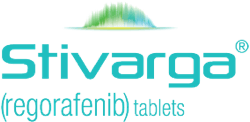Managing side effects
Management of hand-foot skin reaction (HFSR), tiredness, and diarrhea when taking STIVARGA® (regorafenib)
Tips for your experience on STIVARGA
- Side effects may occur early in treatment. It's important to let your doctor or another member of your treatment team know right away, even if you feel it is minor
- Your doctor may adjust your dose of STIVARGA, temporarily stop treatment, or permanently discontinue treatment. Sometimes your doctor may stop treatment entirely
HFSR: What you need to know
HFSR is a common side effect of treatment with STIVARGA. You may not recognize that you have HFSR if you don’t know what to look for. That’s why it is important to catch symptoms early on—and let your treatment team know about them.
Tell your healthcare provider right away if you have even mild symptoms of these skin changes, as they could be signs of HFSR:
Changes in Skin
| Sensation | Numbness, burning, tingling, or “pins and needles” feelings |
|---|---|
| Sensitivity | Increased sensitivity or sensitivity to hot objects |
| Appearance | Redness or swelling |
| Texture | Calluses (hard layers of skin) on the palms of hands or balls/soles of feet, blisters, dry or cracked skin, or flaking or peeling skin |
Tell Your Team
Tell your treatment team right away if you have signs of HFSR on your hands or feet. They will determine how severe your symptoms are and can work with you to help manage them by reducing your dose, temporarily discontinuing, or permanently discontinuing STIVARGA.

Grade 1*

Grade 2*

Grade 3*
Not every skin reaction is HFSR
You may notice a rash on your face or body when taking STIVARGA. Rash is different from HFSR because it does not give you calluses on your feet or hands. A rash can be reddish, itchy, or tender. It can also include small blister-like bumps. If you have rash, talk with your healthcare provider. You may need to see a dermatologist (skin doctor).
*Photos courtesy of S. Karger AG. Reproduced with patients' permission.

Rash*
CARE for HFSR
When thinking about HFSR, remember to "CARE"
Check for and treat any new calluses. Inspect your skin regularly. You can soak your feet weekly for 20-30 minutes in Epsom salts (magnesium sulfate). After soaking, gently pumice any callused skin. Thick calluses require a consult with a podiatrist.
Add cushioning (such as gloves or handle grips) when doing activities that increase pressure on hands. This includes cooking, gardening, sports, and home repair.
Relieve pressure on feet by wearing comfortable, well-padded shoes and loosening laces.
Exfoliate and moisturize skin to keep it soft and well hydrated.
Be Alert
Talk to your healthcare provider right away about any side effects you are having.
Tiredness: What you can do
Feeling tired is common when you have cancer. STIVARGA may also make you feel tired.
If you are feeling tired, try “REST”:
Reprioritize daily tasks to do your most important ones when you have the most energy; don't worry about doing less important things if you are tired.
Exercise lightly or remain active. Follow your doctor’s guidelines for activity.
Stay awake during the day, so you can sleep well at night.
Take time with friends and for activities you enjoy—like listening to music or reading.
Diarrhea: What you can do
STIVARGA may cause diarrhea. If you get diarrhea, tell your healthcare provider right away. You might need treatment to replace important fluids in your body or to keep you from losing too much weight.
Following these tips can help treat diarrhea:
- Eat several small meals each day, instead of 2 or 3 large ones
- Try bland foods, like bananas, rice, applesauce, and toast
- Drink plenty of water, but stay away from hot or iced drinks
- Stay away from spicy foods, dairy products, caffeine, and alcohol
- Take diarrhea medicine as directed by your healthcare provider
Be Alert
Talk to your healthcare provider about any side effects you are having.


